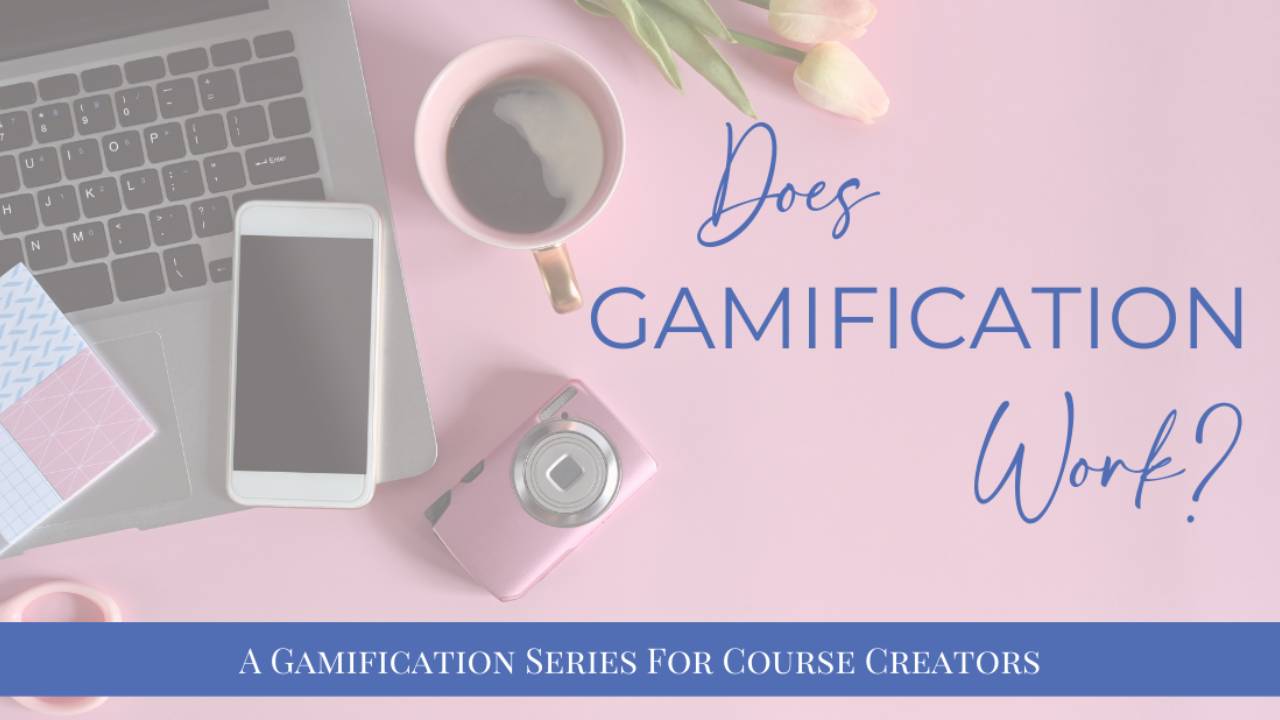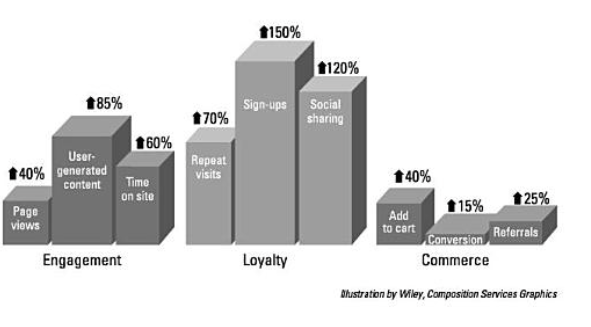
Does Gamification Work?
Gamification has become a buzzword in the world of online education, but does gamification work?
Let's explore how psychology and technology work together to help us understand if gamification works and why it might help both course creators and participants.
Without clear gamification, online course completion rates vary from 0.7% to 52.1% with the average being 12.6%. That means on average, just 12% of your clients complete your course! The longer the course is, the less likely participants are to complete it.
Whaaatttt!!?? All that effort and all the love we’ve poured into making something interesting and filled with knowledge they need to know (otherwise why have they bought it in the first place?!) and the majority of it goes to waste!
Remind me, what is gamification?
Humans love games, from little children to adults, the prospect of receiving a reward for an action is something we are all instinctively attracted to. And using gamification techniques in our business increases people’s interest.
The introduction of game elements like challenges, competition, leaderboards and awards into the learning process ensures high levels of involvement, participation, and interaction. Education that is fun, in addition to being useful, is much more attractive to a potential participant.
Gamification itself is the process of incentivizing peoples’ engagement and activities to drive results with game-like mechanics. A gamification strategy is the process of taking something that already exists – like your course or membership and using gaming techniques to motivate consistent participation. Importantly, the first two weeks are crucial in gaining participant engagement and longer-term commitment. Read my blog Gamifi-what? If you want to find out more about what Gamification actually is. 😉
So, does gamification work? And how do you encourage members to complete training without feeling overwhelmed?
The short answer is yes. Numerous studies have shown that gamification can be an effective tool for engaging learners and most successful programs rely on some degree of behavioural psychology - understanding what motivates someone to engage with a particular activity. In the knowledge commerce industry (fancy term for selling courses!) there has been a boom in online content in the last couple of years, so creators have had to learn how to humanise technology in order to stay competitive.
Here's why Gamification Works for Course Creators
|
What? |
How? |
|
Increased Engagement |
Gamification makes the learning experience more interactive, challenging, and fun, which keeps learners engaged and motivated to continue . |
|
Higher Completion Rates |
By providing learners with clear goals and a sense of progress, gamification can help reduce drop-out rates and increase course completion rates. |
|
Better Learning Outcomes |
Gamification can enhance learning outcomes by promoting active learning, improving memory retention, and increasing knowledge transfer. |
|
Improved Data Collection |
Gamification can provide course creators with valuable data on learner behaviour, preferences, and performance, which can be used to improve course design and delivery methods. |
Here's why Gamification Works for Course Participants
|
What? |
How? |
|
Increased Motivation |
Gamification provides learners with clear goals, feedback, and rewards, which can boost motivation and create a sense of achievement. |
|
Enhanced Learning Experience |
Gamification can make the learning experience more interactive, immersive, and enjoyable, which can lead to better retention and understanding of course material. |
|
Sense of Progress |
Gamification provides learners with a sense of progress and accomplishment. |
|
Peer Comparison |
Gamification enables learners to compare their progress with their peers, fostering a sense of competition and increased motivation. |
Look at these stats! Adding in gamification increased engagement, loyalty and sales!
These figures are combined across different parts of an online business not just courses, but it clearly shows the impact gamification can have on your business when used effectively.

So where does psychology fit in?
One of the key psychological theories that underpin gamification is Self-Determination Theory (SDT), which suggests that people are motivated by three basic needs: autonomy, competence, and relatedness.
Autonomy refers to the need for control over one's environment. Basically choice is good. Learners are engaged when they feel in control and have the power to choose. Think about levels of power or authority you can give people that will make them feel special. What can it be based on?
- Try offering different ways to consume your content. Maybe video is your primary delivery method but if we convert the video to an audio file and then make a transcript or add subtitles we allow learners to choose how they use the content.
- It also means we can choose a different learning format depending on our environment, on our commute we might want to read, if we’re walking the dog we might want to listen.
- Offer choice that provides an impact on their overall end result (ie whether to complete a 10 or 20 point task) encourages challenging themselves with the added bonus of potentially being higher up the leaderboard.
- Ask a member to be a judge in a contest
- Offer the opportunity for them to give feedback which will contribute to future course versions
Competence refers to the need to feel capable and effective. We want to feel we’re mastering the topic, we want feedback on our progress and sometimes a little healthy competition makes us feel competent and confident. To keep working towards success we need a sense of value and purpose.. Humans have an internal drive to make progress, develop skills and overcome challenges. Understanding the level people are at and recognizing it will transform your business. People want to be recognised. It makes them feel proud to be involved. It makes them feel great about their accomplishment. We all want increased status. We want to move upwards. It's the tool that has the greatest impact when you’re thinking about your gamification strategy.
- Give feedback in the form of quiz results
- Set tasks that need completing so you can assess the students competence and offer them targeted feedback.
- Offering points for joining in with something and then showcasing the results on a leaderboard not only show progress, but give kudos to those that are achieving, reflecting their competence and reinforcing how effective the teaching is.
- Award badges for your key objectives. Make sure there are badges for those at all levels so everyone feels they can achieve something!
- Recognise learners as part of a case study
- Add a progress bar to your course
Relatedness refers to the need for social interaction and connection. We’re human, we need to be social and to feel a sense of belonging. We want to feel included and status recognizes members among their peers
- Shout out members of your community, it’ll make them smile and spur others on to reach their levels and get a shout out too. It also gives fellow members the chance to congratulate others which makes them feel included rom the sidelines.
- Just being part of a community can create a sense of value and purpose when we connect with others who are trying to achieve the same as us
- Offer an award ceremony at the end of the course for those going through it together
- Give a badge or a banner to display on their social channels or website for being an alumni or reaching a certain level
- Offer the opportunity for members to mentor others or become a moderator. Fostering new connections whilst being given status makes us feel special
The majority of these actions are measurable so we can use the data to identify areas for improvement and optimise our gamification for better learning outcomes. But don’t forget this is not what makes your product or offer desirable. You still need a solid and valuable proposition to encourage your audience to buy from you, and select the strategies that fit with your business model and values. Applying these pleasurable techniques and strategies make your offer even better and learning should be fun….even if it’s a serious topic!
YES, I WANT GAMIFICATION AND COURSE CREATION EMAILS SENT TO MY INBOX
When you join my list you'll receive semi-regular email newsletters. I try to make these weekly but, hey, sometimes entrepreneurial life runs away with me! 😉
NO. SPAM. EVER
